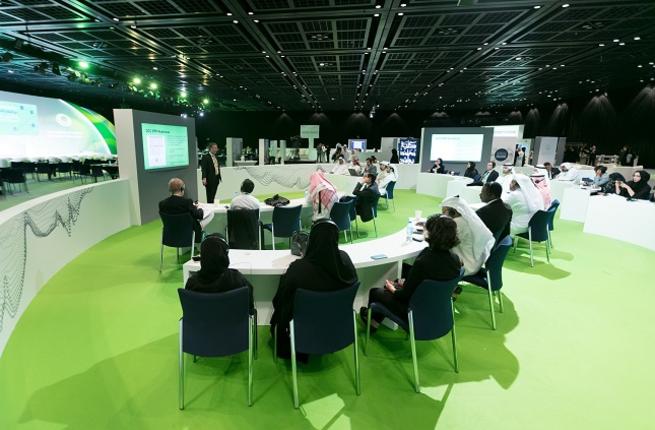
The UAE Public Policy Forum (UAE PPF) 2018 entered its second day today (Tuesday, January 16, 2018) at the Dubai World Trade Centre, organised by the Mohammed Bin Rashid School of Government (MBRSG), the first research and teaching institution focusing on governance and public policy in the Arab world.
Held under the patronage of His Highness Sheikh Hamdan bin Mohammed bin Rashid Al Maktoum, Crown Prince of Dubai and Chairman of the Dubai Executive Council, the two-day forum was inaugurated by H.H. Sheikh Ahmed bin Mohammed bin Rashid Al Maktoum, Chairman of the Mohammed Bin Rashid Al Maktoum Knowledge Foundation (MBRF). The event took place on January 15 and 16 under the theme “The Future of Partnerships with the Private Sector” and covered such diverse sectors as healthcare, education, transportation, technology & innovation, urban development, and sustainable development.
A roundtable discussion titled “PPPs – Who Pays, Who Benefits?”notably welcomed Her Highness Sheikha Shamma Bint Sultan Bin Khalifa Al Nahyan, Philanthropist and Entrepreneur, onto its panel of experts, along with Dr Aisha Abdulla, Executive Dean of Business at the Higher Colleges of Technology; Brad Watson, Partner and Leader of Infrastructure Advisory Practice for the MENA Region at Ernst & Young; Dr Khalid Al Yahya, Managing Director of KPMG’s Public Sector Practice in the Middle East; and finally, Marc Fooks, Project Director for the UAE at Turner and Townsend. The sessions was moderated by Dr. Mark Batey, Leadership, Creativity and Innovation Specialist, Alliance Manchester Business School.
“PPPs are essential for achieving sustainability and the SDGs,” affirmed H.H. Sheikha Shamma. “They accelerate development and encourage more innovative solutions, creating a win-win situation by combining two cultures: a financially-driven private sector entity, with a public-sector entity that cares about the good of the nation. It’s an interesting space because it enables the creation of greater good, quickly.”
An on-the-spot survey of the Forum audience during the session demonstrated a strong expectation for governments to provide subsidies that will alleviate the cost. The end-user will pay for the [PPP] services, the experts commented, which are sometimes subsidized by governments – especially when it comes to infrastructure, hospitals, and so on. The private sector will come into a contract to generate returns on investment for their shareholders, but the approach should be one to create a win-win situation, they explained.
The day had kicked off with a roundtable discussion on “Leveraging PPPs to Advance Sustainable Development Goals”, which brought together Frode Mauring, the UNDP’s Resident Coordinator to the UAE; Ivano Ianelli from the Dubai Carbon Centre for Excellence; Rajai El Khadem, LinkedIn’s Head of Government and Alliances for the MENA Region; Dima Maaytah, Founder and Managing Partner at Sustainable Mindz; and Dr Ziad Sayegh, General Director of Lebanon’s Better Initiative. The session was moderated by Hafed El Ghwell, Senior Advisor, Maxwell Stamp.
The convening experts noted that sustainable development goals (SDGs) have come to be known as the 2030 Agenda – at least from a World Bank perspective – where countries are now held accountable for their progress on SDGs. We are currently looking at a funding gap of $3 billion a year, panellists estimated, which, in many countries, makes public spending alone deeply insufficient to reach development goals. This is where the private sector should be involved considering it usually has better governance with more robust regulatory frameworks. The speakers also called for a new model that connects economic development to social justice so that we avoid curbing monetary risks at the expense of human welfare. It isn’t just the governments that need to work towards these goals, everyone needs to pull their own weight. The UAE stands out for prioritising sustainable development as a main component in all development plans, where the Emirates has even formed a national SDG committee.
The day’s activities also included four concurrent sessions or “Knowledge Hubs”, the first of which explored “PPPs in Infrastructure Development”. Speakers noted that to engage the private sector, their expectations must be taken into account; the public-sector entity should provide examples of precedents, outline its risk transfer procedures, and determine credit support measures, among others. On the flip side, when governments consider going into a PPP to develop infrastructure, according to the experts, they look into ways to optimise the outcomes of the PPP; the administrative burden on the government; the overall legal and regulatory environment; economic externality (i.e. the deals should be appealing to a global bank); and the typical financial and funding expectations of the private sector.
The second Knowledge Hub – “Innovation and Implementation of PPPs” – re-examined the Dubai Government’s commitment to innovation and adherence to the highest standards of prosperity and development at the individual and institutional and team level. The experts also reviewed surveys, studies and analyses on innovation in public-private partnerships, and the impact of these partnerships on the community and the country as a whole.
The third concurrent session explored “Alternative Thinking About PPPs”, where panellists acknowledged the importance of building partnerships that are based on local capacities and that benefit from country-specific experiences. Therefore, the import of ready-made models does not lead to the best results, they concluded. The concurrent session then wrapped up with a “PPP Executive Seminar”.
The third and final roundtable discussion of the day – “Future Trends in PPPs in the MENA Region” – brought together H.E. Mahmoud Bernawi, General Director of the Planning and Development Department at KSA’s Economic City; H.E. Dr Nasser al-Qahtani, Director-General of the Arab Administrative Development Organisation; Fahad Al Hammad, CEO at Tatweer Building Company; and Dr Refaat Al-Faouri, Former President of Yarmouk University.
Moderated by Prof Raed Awamleh, Dean at MBRSG, the session saw panellists reaffirm the necessity for governments to maintain an advisory and supervisory role when entering PPPs, regardless of how efficient the private sector may be. Laws and regulations that ensure governance and transparency are key for successful partnerships, which are, in turn, essential for economic development. The experts went on to note that government services have witnessed drastic changes in the past 30 years; Arab Governments, however, have been lagging behind in that regard.
Finally, day two included an open dialogue with “Special Guest” Bassel Al Nahlaoui, Managing Director of Careem, who underlined the role of innovation in promoting and supporting public-private partnerships and maximising their impact on society. Al Nahlaoui stressed that everyday-life situations of society members may be a catalyst for innovation; they must hone that innovation and employ it as a tool to move forward. The importance of PPPs stems from the access they allow the public sector into the innovation policies adopted by the private sector in the development of services.
The UAE Public Policy Forum 2018 sought to help stakeholders in both public and private sectors evaluate partnership projects in the UAE and the region, exchange ideas and experiences, and develop new policies, regulations and action plans for sustainable development and the knowledge economy. It focused on six main pillars: Identifying and evaluating opportunities for public-private partnerships; creating an enabling environment for PPPs; discussing visions and strategies to improve partnerships and increase effectiveness; performance evaluation; using smart technologies and innovation to the benefit of PPPs; and developing policies to govern public-private partnerships in the future.

